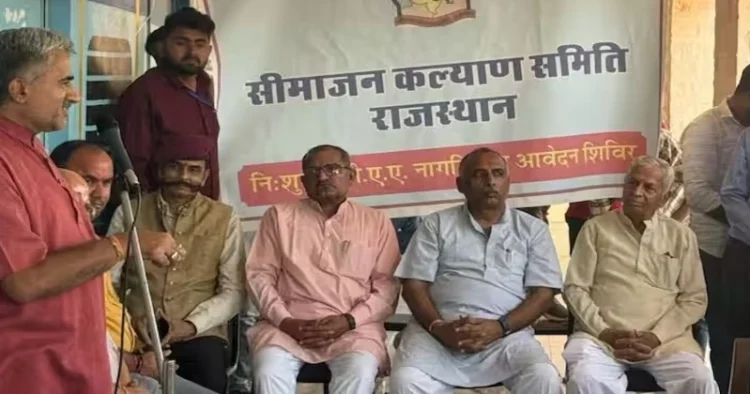In a concerted effort to provide sanctuary and legal recognition to ill treated Hindu immigrants from Pakistan, a dedicated Rashtriya Swayamsevak Sangh (RSS) affiliated organisation known as “Seemajan Kalyan Samiti” has been conducting camps in the areas of Rajasthan for the past one week. These camps are being used as a platform to issue “eligibility certificates,” to the concerned people. The eligibility certificate is a crucial step for applying for citizenship under the Citizenship (Amendment) Act, 2019 (CAA).
At present, the Samiti is operating primarily in the regions along the Pakistan border and has already assisted more than 300 individuals from Barmer, Jaisalmer, and Jodhpur in Rajasthan. For these individuals, the Samiti has helped in uploading their documents on the official citizenship portal i.e. indiancitizenshiponline.nic.in, initiated by the Home Ministry of India.
Vikram Singh Rajpurohit, an advocate and member of the group, explained that Samiti’s registered status enables it to issue these certificates. He highlighted the pivotal role of office-bearer Tribhuvan Singh Rathore in endorsing these certificates, emphasising the community-based nature of their organisation. These certificates, also obtainable from local priests, validate the religious affiliation of the applicant and affirm their continued adherence to the faith.
Some people may call it bureaucratic, but for many its not. Rather it’s a lifeline for those who have long awaited for their recognition. Mr. Rajpurohit shared the plight of numerous individuals who arrived in India before 2010, and said that they yet remain in limbo regarding their citizenship status. Remembering an incidient, he recounted meeting a woman who arrived in India in 1998 but still does not have citizenship. This indicates a pervasive issue. As per stats, in Jodhpur alone, an estimated 5000 to 6000 individuals are facing challenges related to citizenship.
Rajasthan hosts approximately 400 settlements of Pakistani Hindu refugees, comprising around two lakh people who had to fly hostile in different waves of migration. Notably, these refugees entered India legally, probably on pilgrimage or tourist visas, rendering them eligible for citizenship under Sections 5 and 6 of the Citizenship Act, 1955.
The CAA represents a significant milestone for these migrants by giving them a streamlined pathway to citizenship. The law aims to expedite the citizenship process for legitimate migrants by reducing the eligibility criteria from 12 years of residency to just five years. However, certain challenges persist for those groups like the Matuas from West Bengal, who migrated from Bangladesh during and after the 1971 war because the CAA portal demands additional documentation.
Some critics, such as Trinamool Congress leader Mamata Bala Thakur, have raised their concerns over the implementation of the CAA, alleging that it leads to favoritism and exploitation of religious sentiments. Questions arise regarding the necessity of alternative certification methods when legal pathways already exist.
The recent notification of the Citizenship Amendment Rules 2024, signifies an important step forward in the implementation of the CAA as it offers hope to legal migrants like the Pakistani Hindu community. However, the complete process remains complex as it requires meticulous documentation and various regulations.
About CAA
The Citizenship Amendment Act (CAA) is a piece of legislation that was passed by the Parliament of India in December 2019. The act amends the Citizenship Act of 1955 to grant Indian citizenship to religious minorities (Hindus, Sikhs, Buddhists, Jains, Parsis, and Christians) from three neighboring countries i.e. Pakistan, Afghanistan, and Bangladesh, who arrived in India before December 31, 2014, due to religious persecution or fear of persecution in their home countries.
Muslims have not been included in the list of eligible communities under CAA, which has sparked controversy and criticism, with opponents arguing that it violates the secular principles written in the constitution of India. The government, on the other hand, says that the act is a humanitarian measure to protect ill-treated minorities and streamline the process of granting citizenship to those who have faced religious discrimination in neighboring countries.




















Comments